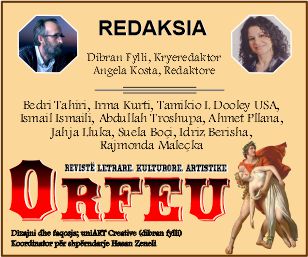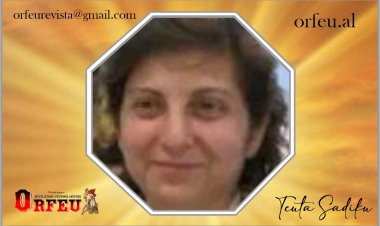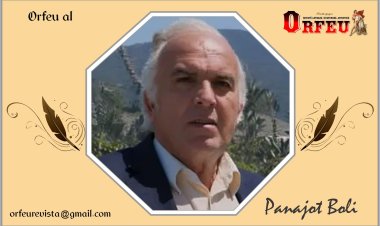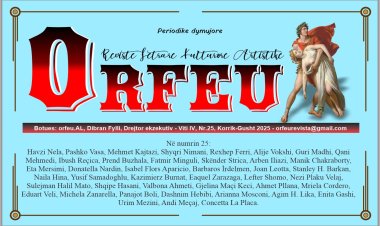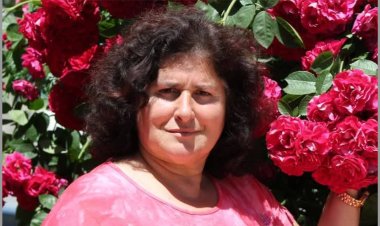Akaterini Vlachopanagiotou – Batalia - BRIEF CV
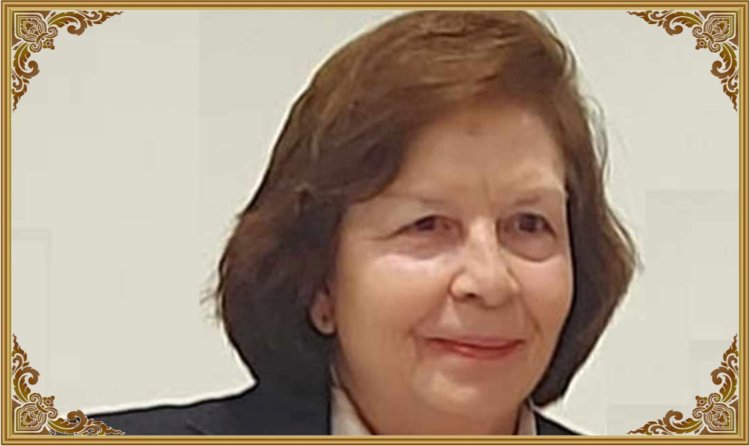
Of the 14th World Philosophical Forum Symposium
AKATERINI VLACHOPANAGIOTOU - BATALIA
She was born in Litochoro, Pieria, where she received her first letters. He finished Secondary Education in Thessaloniki. In 1974 she graduated from the
Panteion School of Political Science and in 1990 from the Pedagogical Department of the National and Kapodistrian University of Athens. She works as a Classroom Economist, a member of the UN, Ph.D. D. e. t. in Byzantine Humanism (Konstantinos Tsirpanlis). She is the mother of two s children’s cientists She was General Secretary/Vice President of the International Society of Greek Writers (D.E.E.L.) and the International Academy of Letters & Arts "THEA ATHENS". He served also from the position of General Secretary of Letters, Arts, and Culture through the great work of the two organizations from 1993 to November 2019, when he was elected President of the International Society of Greek Writers. She contributed greatly, with the ex-president Chrysoula Varveri - Varra, in the organization and with full success of the 1st International Literature and Painting Competition, proposing the registered name of "MELINEIA TROPAIA" 1996. Also she organized with the President the CULTURAL OLYMPIAD
“PANATHINEA 2004”
She studied and presented great writers such as: Seferis, Elytis, N. Vrettakos, Kazanzakis, Palamas and many contemporary writers and poets. She participated with excerpts of her work in the International Exhibition of Frankfurt (2001). In 2007 she presented in the Book Gallery "7 odes to Heaven" by the Writer Poet El-Kris (Kostas Kartsakis - Dodoni Publications). Her speech was honored with the BRETTAKIO ’96 award of D.E.E.L
She participates with an introductory text in the two Anthologies of DEEL
"Letters-Arts-Culture" 1997 and "Panathinaea 2004". He has been honored with the
JOCARLOS GASPAR- “UM POETA DE CAXIAS 2006” diploma and with the RIO
DE JANEIRO-SEGURANCA PUBLIKA 2006 diploma". Speeches were delivered at the Annual Poetry Events at the Cultural Center of
the Municipality of Athens for twenty-seven years, contributing to the organization of the ex-President and Founders Chr. Varveri - Barra. In 2007 she represented her at the International Festival on Lake Qinghai in China to honor the long tradition of poetry, to cultivate the exchange of cultures and dialogue between poets from all over the world and the subject was: “Man and nature in a harmonious world”. She participated in the anthology and the poem about nature won the first prize. She organized the literature competition in Greece with the "KOSHINOKUNI Museum of Literature in Toyama City Japan in year 2017. She has studied, presented and wrote about great writers and poets and has wrote the forward in varies Anthologies. Recently at the Third Anthology of World Gogyoshi 2021 by Taro Aizu. Her published works are:
"Critique of existing regional development incentives in Greece and the provincial industry"
"The concept of classical works"
"The story of the number" bachelor's thesis
“The epic of Digenes Akritas. Folk poetry”
"Historical background of music"
"The Carnival and its customs in Greece"
"Searching for peaceful coexistence with ourselves"
"The contribution of the fairy tale to the ethno plastic education of the child"
"The struggle with ourselves"
"Become a hero" etc.
She wrote the forewords of the Anthologies 2020 edition: "POETIC ODYSSEY" GREECE -TUNISIA ABDALLAH GASMI with Eva Petropoulou Lianou
"International Anthology of International Society of Greek Writers and Artists: "200 years since the Greek revolution of 1821"(pages 822)
She has published many writers works and has cooperation with many
Associations and especially with the Cultural Salon of Tunisia- President
Abdallah Gasmi and is Partner of him. Today, She is President of the International Society of Greek Writers (D.E.E.L) and she is working hard to promote the exchange culture between different countries all over the world, so as to promote world Peace and the spiritual development of humanity.
THE INTERNATIONAL SOCIETY OF GREEK LITERATURE ARTISTS (D.E.E.L.)
PARTICIPATED IN THE WORKS OF THE 14TH SYMPOSIUM
OF CLASSICAL- PRACTICAL PHILOSOPHY OF THE GREEK- CENTRAL SECTOR OF THE WORLD PHILOSOPHICAL FORUM, (P.F.F)
AND THE ASSOCIATIONS OF CULTURE AND DEVELOPMENT (ENPAAN)
In the topic entitled: "The pedagogical contribution of Classical-Practical Philosophy in the fight against all kinds of prejudices"
06-11-2023
SPEECH OF AKATERINI VLACHOPANAGIOTOU - BATALIA
President D.E.E.L.
First of all, allow me to congratulate the President of the Greek-Central Sector of the World Philosophical Forum, (P.F.F) Classical-Practical Philosophy, Professor Stefanos Roy for choosing the topic of the 14th Symposium, namely: how with the following the symbols of the Classical - Practical PHILOSOPHY we will achieve the and fighting all kinds of prejudices that shape our perceptions and beliefs about our world today. In this speech, my purpose is to present how necessary the education of Classical-Practical philosophy is, that is, the effort to cultivate healthy thinking in the virtuous person, through which the formation of a healthy mind with minimized prejudice is achieved, so as to allow the precise demarcation of what is right.
In the social sciences, when we say prejudice, we mean an unjustified or mistaken attitude (usually negative) towards persons or groups, which is based on stereotyped beliefs, is formed in advance, and is not based on actual characteristics.
The knowledge gathered by scientific studies depends to a large extent on how we interpret the evidence. Interpretations, however, obey the same rules that govern our perceptions of reality. They are full of assumptions, generalizations, omissions, and errors, which are called cognitive prejudices and are built into both the perceptual and emotional mechanisms of the brain, as well as cognitive ones. By the time the perceptual information reaches consciousness, the individual has managed to transform it into something new and unique. This reconstruction of reality is the foundation upon which we build our beliefs about the world. Logic, common sense and social consensus also play an important role in shaping our beliefs. These factors also affect the way we understand the world. The purpose of each is to identify these prejudices.
Most people fail to realize how many cognitive biases they have or how often they fall victim to these biases. To some extent, we all manipulate others to get them to embrace our beliefs. Parents do it with their children, teachers with their students, researchers with their colleagues, lovers with each other. Unfortunately, we often do this without realizing the other person's interests and needs.
Over the past 50 years, researchers, scientists, psychologists and sociologists have identified hundreds of cognitive, social and behavioral processes, as well as decision-making processes. I will list a few prejudices, epigrammatically in my speech due to the brevity of time, which are considered necessary to evaluate our perceptions and beliefs about the world, such as: The prejudices of family, charm, confirmation, self-serving, group, social consensus, crowd , projection, anticipation, "magic numbers", probability, cause-effect, pleasure, personification, perception, false-positive memory, logic, persuasion bias, first, publicity, blind spot.
(The prejudice of the family)
All of us are predisposed to automatically believe information provided to us by family members and close friends. From the time we are born, our brains are based on these people, so we tend to accept the world without checking the facts.
The bias of power.
We tend to believe people in positions of power and prestige. We consider them more reliable, without checking their sources.
The charm bias.
We find taller and more attractive people more trustworthy because our brains are drawn to what is aesthetically pleasing. More presentable people are more likely to convince us.
The confirmation bias.
We tend to emphasize information that supports our beliefs, while subconsciously ignoring or dismissing information that contradicts them. Once our beliefs are embedded in our neural circuitry, evidence that opposes them cannot often invade existing brain processes.
The self-serving bias.
Coupled with confirmation bias, we also tend to hold beliefs that favor our personal interests and goals.
Group bias.
Subconsciously, we favor the rest of our group and rarely question their beliefs because our brains are wired to seek agreement with those around us.
Outgroup bias.
In general, we reject or devalue the beliefs of people outside our group, especially when their beliefs differ markedly from our own. Furthermore, we are biologically predisposed to become upset when we meet people of different ethnic and cultural backgrounds – even if they are members of our own group.
The social consensus bias.
The more others agree with us, the more we believe our beliefs are true. Conversely, the more others disagree with us, the more likely we are to repress and question our own beliefs – even when they are correct.
The bias of the crowd.
This bias reflects our tendency to adopt the belief system of the group we belong to. The more people around us, the more likely we are to modify our beliefs to match theirs.
Viewing bias.
We often assume, without verifying it, that other members of our group have similar beliefs, similar moral values and see the world through our eyes. The CIA describes this bias as the “everyone thinks like us” mentality and considers it one of the most dangerous – because different cultures and different types of people don't think like us.
The anticipation bias.
When we search for information, or when we do some research, we tend to "discover" exactly what we are looking for. In medicine, double-blind studies are intended to eliminate this corrosive bias.
The "magic number" bias.
Numbers influence our beliefs because of the brain's powerful quantitative functions. The bigger and more evocative a number is, the greater its emotional response. And this, in turn, strengthens our confidence in the information that is determined quantitatively.
The probability bias.
We like to think that we are luckier than others and that we can fight inequalities (depressed people tend to think otherwise). This optimism is also known as the gambler's bias. If you flip a coin, and land heads 9 times in a row, most people will bet a lot of money that the next time it will be heads. Of course, the odds remain the same each time you flip a coin: there is always a 50 percent chance of landing letters. Also, we all carry "magical" prejudices from our childhood. Thus, many adults, especially gamblers, carry various amulets (a four-leaf clover, a hare's foot, a coin) on them that are supposed to bring them luck.
The cause-and-effect bias.
Our brains are predisposed to make associations between two events, even when there is no connection between them. If you drink an herb and your cold goes away, then you attribute your recovery to that herb, even though dozens of other unrelated factors actually contributed to it.
The pleasure bias.
We tend to believe that pleasant experiences reflect greater truths than unpleasant experiences. Partly because the brain's pleasure centers help control the power of perceptions, memories and thoughts.
The personalization bias.
We show a particular preference for ascribing the virtues of animate beings to inanimate objects. Also. we tend to give human or animal form to abstract stimuli (shadows, confused noises, etc.). This perceptual and cognitive function gives rise to various superstitions.
The perception bias.
Our brains automatically assume that our perceptions and beliefs represent objective truths about ourselves and the world. Hence the expression "If I don't see it, I won't believe it."
The persistence bias.
When we believe something, we insist that it is true, even when we have evidence to the contrary. And the longer we hold certain beliefs, the more deeply they become imprinted on our neural circuitry.
The false memory bias.
Our brain tends to retain false memories for a longer period than true ones. Also, it is easy to implant false memories in others when the right conditions are present and the information is plausible.
The positive memory bias.
When we look back on the past, we tend to embellish the events and give them a more positive force than they really are.
The bias of logic.
We tend to believe arguments that seem more logical to us. We also tend to ignore information that doesn't seem to make sense to us. As William James has said: "As a rule, we disbelieve facts and theories that seem worthless."
The persuasion bias.
When we disagree on an issue, we usually believe the person who has the most dramatic and emotional arguments for a point of view. Our brains tend to tune in to good speakers, so if we run the risk of getting caught up in their emotions and beliefs.
The bias of the former.
We give more weight to and remember more easily names and information that appear first in a list.
The uncertainty bias.
Our brain does not like uncertainty and vagueness. Therefore, rather than not being sure, we prefer either to believe or not to believe.
The bias of emotions.
Strong emotions usually get in the way of logic and good judgment. Anger tends to make us believe that we are right and that we are right. Anxiety undermines this very belief, while depression overshadows optimistic beliefs.
The publicity bias.
Publishers of books, newspapers and magazines prefer to publish works with a happy ending, while rejecting works with a negative outcome. Thus, research that has no effect on the world is less likely to be published than a finding with positive results. Another dimension of this prejudice is the tendency of readers to automatically take what is published as true, even if it is a publication of the yellow press.
The blind spot bias.
Last, but very important, is the bias that scientists call "blind spot bias." Most people fail to realize how many cognitive prejudices they have or how often they fall victim to these prejudices . Advertisers and politicians are acutely aware of these blind spots and deliberately target our own biases to sell their products or ideas. Unfortunately, we often do this without realizing the other person's interests and needs.
The effects of prejudice are painful:
A. TO THE VICTIM
- Loneliness, isolation
- Marginalization
- Feelings of frustration, hatred and anger
- Violation of human rights
- Unequal treatment of people
B. TO THE INDIVIDUALS
- They are necessarily driven to bigotry and racism.
- They face difficulties in their interpersonal relationships.
- They adopt the ideology of misogyny.
- They often use violence.
The only way to deal with prejudice is:
- "Classical education, from which the organization of human thought originates and which then guides actions, contributes to making them fair, is the answer to social indifference and indifference and the basic vehicle to develop reflexes of social consciousness, that will lead to the removal of prejudices" are:
- The Family: dialogue at home, respect for the child's personality, autonomy of the young person. The family as a primary educational institution influences and determines the unformed young thinking.
- The Mass Media: must not serve the mechanisms of disinformation and propaganda. Unfortunately, the media reproduces stereotypes by propagating similar ideas and prejudices about persons, groups of people, ideologies.
- The School: must provide humanitarian education, development of critical thinking so that stereotypes and prejudices do not exist to such a great extent. The lack of critical thinking for a global view of events, the one-sided and superficial knowledge, does not favor a multi-prismatic view of things, does not exempt from dogmatism and attachment to authorities.
Even religions cultivate a more general way of uncritical acceptance of events and situations.
- The change of the political establishment, which has a direct interest in the discrimination and separation of citizens based on their ideological orientation.
- The fight against organized economic interests, which "construct" derogatory characteristics for social groups, immigrants, to achieve the moral legitimization of their exploitation and unworthy treatment.
- The change of the modern way of life, which leaves no room for man to think. Individualism and selfishness and social inequalities and ideologies are passed down from generation to generation. After all the above we realize how much we need the medicine of classical education, of practical philosophy. The definition of education according to Plato is: "the treatment of the spirit" that is the treatment of thought...and while, when the body is sick it needs medicine, when the spirit is sick it needs education. So how necessary it is for everyone to deepen, to know himself to shake off all kinds of old and outdated prejudices not suitable for a prudent and good life and as Kazantzakis said, to find the way "how to move the human soul, to takes a step further, to escape from the old moral freedoms and habits, to create a new culture". Philosophical engagement does not require, neither any special instrument, nor fixed spatio-temporal conditions. So, if we prepare ourselves through Classical-Practical philosophy, we can hope, returning from where we came, to live in undisturbed contemplation of divine truth. The genuine virtues of courage, fortitude and justice arise through self-view through philosophical identity.
"Philosophy is the guide of all the arts."
The fruits of the earth are made once a year, while the fruits of philosophy are made every moment of the year. It is a road on which we are "on our way", and through which Man is called to reflect. The exhortation to the conscience to write and work on philosophy aims at redemption from smallness and lowly human flaws. Philosophy therefore consists in the fact that confession is achieved through it towards what is on the way, "The Being of being". The knowledge of the depth of things and the search for the essence of beings are movements and attitudes justified and justifying for the sole reason that they attribute importance to the essential. In that which leads to inner peace, to the calmness and reassurance of thought, the control of the senses which lose their power to create complications.
We Greeks let's not forget that Philosophy "speaks" Greek.
Classical education, that is education based on the classical texts of ancient Greek and Latin literature, does not simply concern the foundations of Western - and not only - civilization, but also constitutes the basic superstructure of knowledge and education, which unfortunately she is marginalized and discredited in the country that gave her birth.
The reasons for this marginalization vary.
(Indicatively, I mention some: The examination-oriented operation of the school and the pursuit of grades do not promote essential study and education but sterile memorization with the aim of admission to some A.E.I., the lack of training of teachers, the promotion of subculture and hyper-consumerism in modern society. Furthermore, the commercialization seen nowadays leads to a lack of respect for educational goods that do not provide immediate vocational rehabilitation.)
The person can seek and find solutions to their problems, adopt a positive attitude towards life, imitate values, standards and positive life attitudes, which will complete them and strengthen their personality. The healthy state of mind according to Plato exists when ... reason controls and balances desire and anger and, to clarify the concepts of control and balance, he gives the following example: He likens the spirit to a cart pulled by two horses: one blind which is desire, one mad which is anger and the coachman who is reason and must keep the control and balance between the two horses so that they go the right way, which is the way of virtue…..
So the question arises: can the thread of classical education be cut from our lives?
The answer is no, since the classical studies of Philosophy not only record our lives, but are our lives themselves, and this is because it is intertwined with them, since:
- It connects knowledge with the way of thinking, with the perception of life.
- It highlights a rich set of humanistic values, which forms citizens with critical thinking,
- Cultivates a sense of independence from any source of manipulation.
- It seeks to sculpt the personality of man, so that fight in the best way for personal and social freedom, in conclusion to become more Human.
Thank you!!!
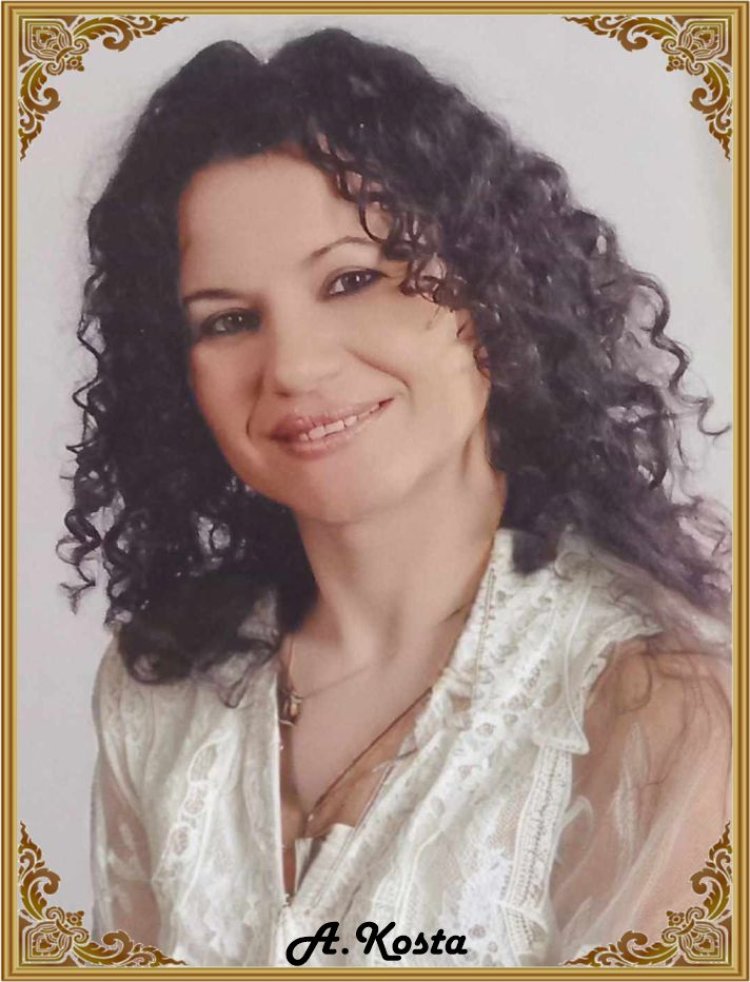



 Moderator
Moderator 